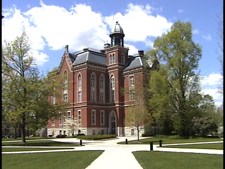Faculty Member's Op-Ed Piece Published in Louisville Courier-Journal
June 23, 2002
 June 23, 2002, Greencastle, Ind. - "The new policy serves to create a YMCA of a Lesser Louisville," writes Brett R. O'Bannon, instructor of political science at DePauw University, in an op-ed piece that was published in the Louisville Courier-Journal. O'Bannon writes of the YMCA of Greater Louisville's decision to no longer allow gays and lesbians in committed relationships to join as families. The essay is posted below:
June 23, 2002, Greencastle, Ind. - "The new policy serves to create a YMCA of a Lesser Louisville," writes Brett R. O'Bannon, instructor of political science at DePauw University, in an op-ed piece that was published in the Louisville Courier-Journal. O'Bannon writes of the YMCA of Greater Louisville's decision to no longer allow gays and lesbians in committed relationships to join as families. The essay is posted below:
YMCA Membership Rules ‘New' Policy Would be Setback for Louisville
by Brett R. O'Bannon
Special to the Courier-Journal, Saturday, June 15, 2002
The YMCA of Greater Louisville, under the relatively new direction of President/CEO Steve Tarver has changed its policy regarding memberships of its gay and lesbian clients. Gays and lesbians in committed relationships can no longer join as families. Though he recently rejected a family membership application for a lesbian couple together for more than 16 years, and who have a daughter, Mr. Tarver denies that this is actually a change in policy. He states that this is merely the implementation of a long-standing policy that had been ignored prior to his tenure. Clearly we should assume that Mr. Tarver is acting in good faith with the community so disappointed with his decision, but this distinction between a change in policy and the choice to begin implementing one long-ignored at the YMCA is a meaningless semantic device. The choice to part company with the many similar facilities in Louisville who continue to offer these memberships is as much a change in policy as would be the choice of the Attorney General's office to begin prosecuting those who violate laws passed in the 19th century regarding lamp lights or spitting on the sidewalk.
And it must be emphasized that this is a free choice on the part of the Greater Louisville YMCA. The institution is not bound by any national affiliation, nor by state statute, as has been implied in recent remarks to the Louisville Eccentric Observer and the Courier-Journal. Numerous YMCA chapters across the United States and Canada graciously accept gay and lesbian family members.
Of course, Mr. Tarver insists that the new policy is not at all discriminatory. In a weak analogy, he has repeatedly asserted that though he is not eligible for a discounted senior citizen membership, he is not unfairly discriminated against. The obvious response to this position is that he will one day become eligible for such a membership. At present, there is no statutory prohibition against growing old. The status he requires of gay and lesbian members, however, is precluded by statute.
So what are the possible functions of the new policy? Mr. Tarver has publicly stated that the point of the policy is to prevent a rash of bogus family applications submitted by those who would seek to gain financial advantage. Such a rationale seems to explain the new policy, until one realizes that only same-sex applications are screened. The obligation to provide legal proof of state-sanctioned marriage is not imposed on heterosexual couples that do not share the same family name, which is an increasingly common choice. Clearly if this new policy were driven by a concern for lost revenues associated with group memberships, then the far larger number of heterosexual families would be required to document their relationships. At any rate, such penny-pinching from an institution that offers discounted rates to any who cannot afford the standard fees is most curious.
On a recent television appearance, Mr. Tarver implied that the new policy is a response to an unspecified number of incidents of inappropriate behavior among gay members. Ignoring for the moment the quite obvious likelihood of inappropriate behavior from heterosexual members, how does disallowing gay and lesbians from joining as families serve to prevent unacceptable behavior from any of its members? If the intention is to prevent gays and lesbians from joining, then simply preventing them from joining as families cannot accomplish the goal. They can and will continue to submit applications from the closet. If any of the members, straight, gay or celibate, violate the rules of the YMCA, then presumably they are subject to punishment, including expulsion. There is no need to presume, and the new policy does, that one's sexual orientation has any bearing at all on one's ability to act in accordance with the rules of polite society.
What, then, does the new policy do? It would seem that the shift in policy at the Greater Louisville YMCA to deny family memberships to gays and lesbians, while ignoring the significant possibility that a great many unevaluated applications are from straight, but non-married couples, simply serves the primary purpose of weighing in on the societal debate about the moral worth of same sex unions in particular, and homosexuality in general. And on this question the new leadership's position is perfectly clear.
As Mr. Tarver discovered during his time with the Suncoast (Florida) family of YMCA, the line between faith and function is a precarious one. When asked about the decision to build a chapel in the facility he helped direct, the St. Petersburg Times quoted him as saying, “Our real mission is to help people reach their potential and achieve self-fulfillment. We are not in the business of converting people.” Why, then, a new policy in Louisville that seems so patently fundamentalist in orientation? Contrary to its name, the new policy serves to create a YMCA of a Lesser Louisville.
Back